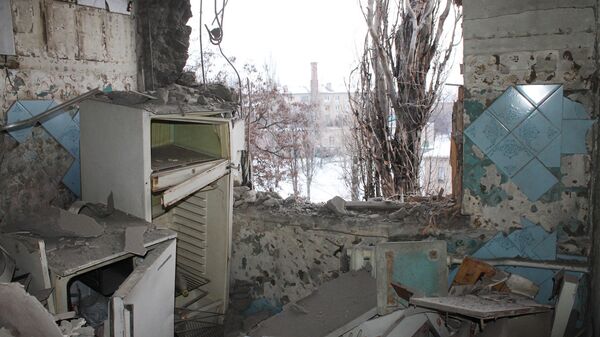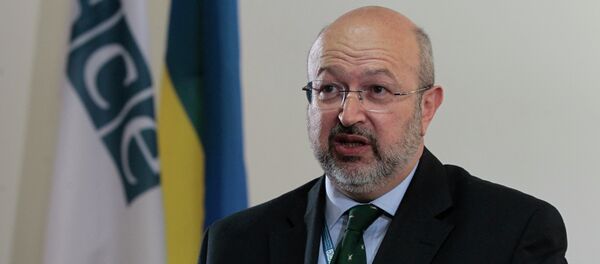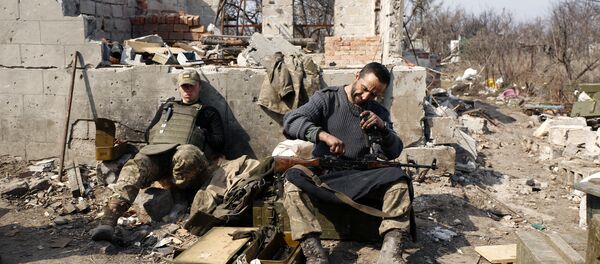MOSCOW (Sputnik) — Earlier on Saturday, a ceasefire timed to the summer harvest has come into force in eastern Ukraine. This is the fourth attempt this year at forcing the warring parties to lay down their arms and allow a peaceful life to resume in the Donbass region, torn by more than three years of fighting.
“There are still a lot of minefields around. There are commitments taken in the context of the implementation of Minsk agreement to proceed to demining of certain areas but we have no evidence of any concrete actions toward demining,” Zannier said.
The OSCE official said that the organization supported the efforts undertaken by the trilateral contact group to resolve the Ukraine conflict but saw little progress.
“Concerning the political process, the OSCE has been supporting the trilateral contact group’s negotiations in Minsk and there too, despite the fact that we try to come up with the initiatives, we see little progress. So, there is a need to revitalize Minsk process,” he added.
The pause in hostilities was brokered earlier this week by a trilateral contact group, composed of Russian, Ukrainian and OSCE mediators.
Officials in the breakaway Lugansk and Donetsk regions vowed to honor the pact. Ukraine's Defense Ministry spokesman Andriy Lysenko argued on Friday that no final deal had been made but added they would go along with the plan.
Zannier also said that he was strongly in favor of the initiative proposed by the International Committee of the Red Cross (ICRC) concerning the establishment of "safety zones" in eastern Ukraine.
On Friday, ICRC Donetsk office chief Michel Saad told Sputnik that the humanitarian organization was ready to broker talks between the Ukrainian government and Donbas forces on the creation of "safety zones."
"This is an initiative that, personally, I strongly support. I think it is important to create the space," Zannier said.
The OSCE chief, however, noted that it would be difficult to implement such a proposal since the two sides did not trust one other.
"There is a problem, unfortunately, of absolute mistrust between the two sides and this is one of the basic issues in the implementation of this proposal," the OSCE secretary general pointed out.
Since 2016, the ICRC has been proposing the creation of "safety zones" in Donbass against the backdrop of the ongoing military conflict in Ukraine. The initiative aims to enhance the protection of vital infrastructure in the region, such as water, gas and electricity plants or lines on the front line or close to it.
The proposal further presupposes the establishment of five zones that will ensure, in particular, access to drinking water. The ICRC insists that zones must include such critical infrastructure sites as, in particular, the Verkhnekalmiusskaya Filtration Station, the Donetsk Filtration Plant, the local network of pipelines, as well as main water pumps in the region.
The Organization for Security and Co-operation in Europe (OSCE) is open to the idea of deploying a police mission in southeastern Ukraine and wants to discuss the matter with the United Nations, the OSCE stated, adding that no decision should be taken whilst the situation on the ground remains volatile.
On June 7, Ukraine's President Petro Poroshenko called on OSCE Chairperson-in-Office Sebastian Kurz to intensify consultations on the introduction of an OSCE police mission in the Ukrainian region of Donbass.
"We are open to this idea and we also have been doing internal planning on how to implement it and we will be discussing it with the United Nations," Zannier said.
The official, however, drew attention to the fact that two issues needed to first be resolved before deploying such a mission in Ukraine, namely there should be an agreement among all OSCE members with a mandate describing the essence of the police mission and a safe environment in the region.
"We need first of all an overall ceasefire. I don't think it is even thinkable of deploying mission in the context when we have weapons and violations of the ceasefire. The policemen will be in danger themselves," the OSCE secretary general noted.
In late December 2016, Russia's Permanent Representative at the OSCE Alexander Lukashevich said that an armed police mission might undermine the stability in the region. In January, Russian Foreign Minister Sergey Lavrov said the proposal to deploy an OSCE police mission in Donbass contradicted the Minsk peace agreements.
The deployment can be carried out only after it is unanimously approved by all 57 OSCE members.
A violent military conflict in Ukraine started in 2014 after the residents of Donbass refused to recognize the new Ukrainian government that came to power, in what they perceived to be a coup. The ceasefire agreement was reached in Minsk in 2015, brokered by the leaders of France, Germany, Russia, and Ukraine, but the situation has remained tense and unresolved.







